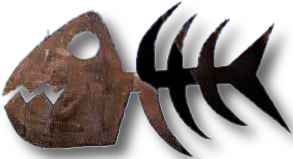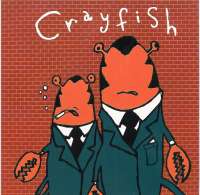Lucian
"A true story"
Part 4
WE hurried towards the farm, and found an old man and a lad busy gardening. They were watering, with water piped from the spring which we'd seen. We were excited and scared: as they obviously were too! So for quite a while we stood silently staring at each other. The old man cracked first. "You're not from round here," he said. "Who are you?"
It turned out the the old man is also from the outside world - his ship had been swallowed 27 years previously. Life-stories are exchanged, and the old man describes what living inside the whale is like. They have a nice house, a lovely garden, running water, their own grapevines, and, for relaxation, excellent fishing and wonderful sailing. It is paradise. But not quite. One thing ruins it - the neighbours.
"What! You mean there are more people in the whale?"
"Yes - in the forest. But they are all mutants, and not at all friendly.
You've got the Bloaters: vicious blighters with eyes like eels and faces
like lobsters. Then there's the Sea-men - half man half fish - though actually
they can be quite decent chaps. On the port side [can't have east and west
inside a moving whale. ed.] are men with crab-claws for hands, and men with
mullets for heads [i.e. the fish - not quite as horrific as the 70's hairstyle.
ed] These two lots are in cahoots. Deep inside the forest live men with
herrings for feet, the Kipper-slippers, and, worst of all, the Krayfish,
experts at the quick hit and nifty getaway.
 The Krayfish run a protection
racket: I'm made to pay them 500 oysters a year. All I want is a quiet
life, but how can me and the boy fight all these mutants?"
The Krayfish run a protection
racket: I'm made to pay them 500 oysters a year. All I want is a quiet
life, but how can me and the boy fight all these mutants?"
"How many of them are there?"
"More than a thousand."
"What weapons have they got?"
"Fishbones."
"Fishbones!" I exclaimed. "What are we waiting for? We've got weapons and
they haven't. Let's have a war. That's the way to get peace. Then we shall all
live happily ever after."
And that's what they do. They utterly exterminate all the enemy mutants - except the Sea-men, who escape by swimming out through the whale's gills. [Yes, we know whales are mammals, but Lucian hadn't got the Discovery Channel.] There was only one casualty on the home side - the boatswain got speared by a haddock-bone and died of food-poisoning.
We now had the country to ourselves, and settled down to enjoy the sport, watching our vines grow, and waiting for the fruit to drop off the trees. We had a life of total leisure. Just like being in prison - which we were. We lived in this style for a year and eight months. But on the 5th day of the 9th month, at 2 o'mouth (that's how we told the time - the whale opened his gob every hour on the hour) we heard a deafening rumpus outside the prison…
PEOPLE were screaming orders, and there was the crunch of oarblades striking the water in unison. We crept closer to the Whale's mouth. What we saw was incredible - more incredible than anything else we saw on our adventure. Men - huge - 100 yards tall - were rowing warships. Only they weren't triremes, they were actually islands! I know you are not going to believe this, but I'll tell you anyway. The islands were fairly flat, and about three miles in length. Sitting on them were 120 oarsmen, oars on either side alternately, rowing with fully-grown cypress trees, branches, leaves and all. The cox sat at the stern on a high hill, wielding a bronze steering-oar over half a mile long. Marines were ready for action at the bow - about 40 of them per ship. They were exactly like men - despite their size - except for their hairstyles. They had flaming fire on their heads, which meant they didn't need a helmet or a crest. The islands were well-wooded - the trees caught the wind, so sails were unnecessary. They cruised along under the effective oar-power as the boatswain bellowed "In, out! In, out!"
 We saw two or three to begin
with, but eventually there must have been about 600 - a full-scale sea-battle
was in progress. Islands were ramming other islands head-on, or crashing
together amidships. Many were sunk. Some islands used a giant squid as a
grappling-hook : when the suckers on their tentacles stuck, the islands were
locked together, so that the marines could board and fight hand-to-hand.
Their weapons were oysters the size of a wagon, and 100 foot sponges. Finally
one fleet routed the other, sinking about 150 enemy islands, and capturing
three. The losers made off. The winners, too, had lost islands - about 80.
That night they anchored their remaining islands around the Whale - using
glass anchors, and fixing shorelines to the Whale. Next morning they sacrificed
on the Whale's back, buried their dead on him, and sailed away, singing
songs of victory.
We saw two or three to begin
with, but eventually there must have been about 600 - a full-scale sea-battle
was in progress. Islands were ramming other islands head-on, or crashing
together amidships. Many were sunk. Some islands used a giant squid as a
grappling-hook : when the suckers on their tentacles stuck, the islands were
locked together, so that the marines could board and fight hand-to-hand.
Their weapons were oysters the size of a wagon, and 100 foot sponges. Finally
one fleet routed the other, sinking about 150 enemy islands, and capturing
three. The losers made off. The winners, too, had lost islands - about 80.
That night they anchored their remaining islands around the Whale - using
glass anchors, and fixing shorelines to the Whale. Next morning they sacrificed
on the Whale's back, buried their dead on him, and sailed away, singing
songs of victory.
Apart from this incident, life in the Whale was getting extremely boring. So I began thinking about how I could escape…
Here ends Part One of Lucian's "A True Story". Ready for Part Two?
<<back |
continue>> |

